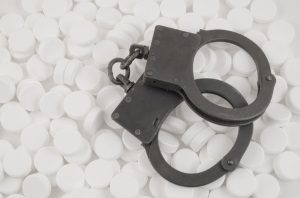 Drug laws in Florida are among the strictest in the country. Simple drug possession implies that a defendant had no intent to manufacture or distribute a drug at the time of his or her arrest. Each drug is categorized under the law as a “controlled substance,” for which there are various levels. Even prescription drugs can procure criminal drug charges if one is caught without a valid prescription. The higher the quantity of the drug discovered, the more likely the suspect will face felony drug charges.
Drug laws in Florida are among the strictest in the country. Simple drug possession implies that a defendant had no intent to manufacture or distribute a drug at the time of his or her arrest. Each drug is categorized under the law as a “controlled substance,” for which there are various levels. Even prescription drugs can procure criminal drug charges if one is caught without a valid prescription. The higher the quantity of the drug discovered, the more likely the suspect will face felony drug charges.
What is Drug Possession in Florida?
Simple possession occurs when a person carries illegal drugs for personal use. It is the possession of drugs by a person who did not manufacture, distribute, or sell the controlled substance with which he or she was caught. The possession of almost all controlled substances may be charged as a felony, except for medical marijuana; charges heavily depend on the quantity discovered.
Additionally, having 20 or fewer grams of cannabis on you is a first-degree misdemeanor offense in Florida.
Drug Possession with the Intent to Distribute
Federal law classifies possession with the intent to distribute a felony crime punishable by imprisonment and fines. To prove this crime, three elements must be met:
Possession
Possession of most controlled substances is prohibited by federal and state governments. Under the law, possession is not just physically having the drug in one’s shirt pocket or one’s purse; it also includes having the drug in one’s control in a remote location, such as one’s home or car.
To establish this element, a prosecutor must prove that the accused had actual knowledge of the drug and its status as a controlled substance. Many jurisdictions allow the prosecution to establish that the defendant “should have known” the drugs were in his possession, or that the drug was a controlled substance, which makes possession the easiest element to prove. This is particularly severe in Florida, where the state’s Supreme Court recently ruled that the knowledge requirement is not necessary to prosecute possession.
Intent to Distribute
The prosecution must also prove what the defendant was planning to do with the drug(s) in possession. Based on how much of the drug was available at the time of arrest, it can be implied whether the defendant was planning or intending to distribute or sell the drug. If the defendant was found with an amount that is too large for personal use, this element can be proved, along with other factors such as the presence of drug paraphernalia, packaging materials, and large quantities of cash.
Possession with the Intent to Distribute
This crime has not occurred unless the two previous elements occurred simultaneously. If the accused possessed just enough for personal use, it is likely he did not intend to distribute or sell the drug. Thus, he can only be charged with possession.
Whether or not this charge is considered a felony offense depends entirely on the amount and type of the substance in question. Let’s briefly summarize how drugs are classified.
Drug Classification
Schedule I. According to § 893.03 of the Florida Statutes, a substance in Schedule I has a high potential for abuse and no currently accepted medical use in treatment in the US. No prescriptions may be written for Schedule I substances. The most common Schedule I drugs include heroin, marijuana, LSD, and ecstasy.
Schedule II. Drugs that fall under this category have a high abuse potential, but they also have a currently accepted medical use with severe restrictions. Narcotics like hydrocodone (Vicodin) methadone, morphine, opium, and oxycodone fall under this category. Stimulants like amphetamines, methamphetamines, methylphenidate (Ritalin), and cocaine are also included.
Schedule III. Schedule 3 drugs have less severe abuse potential than Schedule 1 or 2 drugs and have currently accepted medical uses. Abuse may lead to moderate or low physical dependence or high psychological dependence. Anabolic steroids fall under Schedule 3.
Penalties
Marijuana
Possession of 20 or fewer grams of marijuana in Florida is considered a first-degree misdemeanor, making marijuana the only Schedule I substance that can receive a misdemeanor charge.
Possession of more than 20 grams results in a third-degree felony charge if convicted. This means that the maximum penalty is 5 years in jail and a $5,000 fine.
Heroin, Cocaine, Ecstasy
For these drugs, simple possession automatically results in a third-degree felony for amounts under 10 grams.
Possessing over 10 grams of heroin and/ or most Schedule I drugs is a first-degree felony. This results in a maximum penalty of 30 years in prison and up to $10,000 in fines.
Prescription Drugs
If the defendant cannot prove he has a valid prescription for any pills in his possession, he can be charged with illegal possession of prescription drugs. Since many of these are opiates or stimulants, many prescription drug convictions result in third-degree felonies.
Finding a Drug Lawyer in West Palm Beach
Navigating criminal law as it pertains to drugs can become a complicated endeavor. Drug charges can spark a ripple effect that negatively impacts your life, and must be treated with care and professionalism. When you need an experienced drug lawyer in Palm Beach County, turn to attorney Brian P. Gabriel. Mr. Gabriel has practiced criminal law and worked as a defense attorney for over 30 years. Call 561-622-5575 for a free consultation or complete a contact form today.


